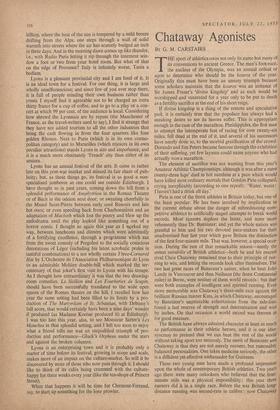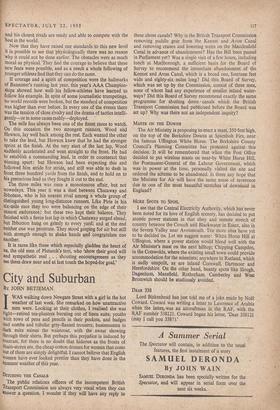Chataway Agonistes
BY G. M. CARSTAIRS THE sport of athletics owes not only its name but many of its conventions to ancient Greece. The men's foot-race, the nucleus of the Olympia, was an .annual ordeal or agon to determine who should be the kouros of the year. Originally this must have been an uneasy triumph because some scholars maintain that the kouros was an instance of Sir James Fraser's 'divine kingship' and as such would be worshipped and venerated for a year only to be put to death as a fertility sacrifice at the end of his short reign. If divine kingship is a thing of the remote and speculative past. it is certainly true that the populace has always had a sneaking desire to see its heroes suffer. This is appropriate enough in the case of the marathon. Pheidippides, the first man to attempt the intemperate feat of racing for over twenty-six miles, fell dead at the end of it, and several of his successors have nearly done so, to the morbid gratification of the crowd. Dorando and Jim Peters became famous through the exhibition of their suffering, yet few laymen could name anyone who had actually won a marathon.
The element of sacrifice was not wanting from this year's Amateur Athletic Championships, although it was after a mere twenty-three laps' duel in hot sunshine at a pace which would have killed most ordinary mortals that Gordon Pixie collapsed, crying inexplicably (according to one report): 'Water. water: I haven't had a drink all day.'
Pixie is one of the finest athletes in Britain today, but one of the least popular. He has been involved by implication in the current debate about the danger of subordinating corn- petitive athletics to artificially staged attempts to break world records. Most runners deplore the latter, and none more vehemently than Dr. Bannister; and yet the whole nation was grateftil to him and his two devoted pace-makers for their unadvertised feat last year which gave Britain the distinction of the first four-minute mile. That was, however, a special occa- sion. During the rest of that remarkable season—surely the annus mirabilis of British athletics—both he and his nearest rival Chris Chataway remained true to their principle of run- ning to win, and letting the records look after themselves. The two last great races of Bannister's career, when he beat John Landy in Vancouver and then Neilsson (the finest Continental miler) in Berne, were neither of them world records : but they were both examples of intelligent and spirited running. Even more, memorable was Chataway's three-mile race against the brilliant Russian runner Kuts, in which Chataway, encouraged by Bannister's unprintable exhortations from the side-line. found a last reserve of strength and determination and won by inches. On that occasion a world record was thrown in for good measure.
The British have always admired character at least as much as performance in their athletic heroes; and it is our idio- syncrasy to pretend that we can beat the rest of the world without taking sport too seriously. The merit of Bannister and Chataway is that they are not merely runners, but reasonably balanced personalities. One takes medicine seriously, the other is a diffident yet effective ambassador for Guinness.
These two young men have made a profound impression upon the whole of contemporary British athletics. Two years ago there were many onlookers who believed that the four- minute mile was a physical impossibility : this year three runners did it in a single race. Before the war British long- distance running was second-rate in calibre : now Chataway and his closest rivals are ready and able to compete with the best in the world.
Now that they have raised our standards to this new level it is possible to see that physiologically there was no reason Why it could not be done earlier. The obstacles were as much moral as physical. They had the courage to believe that these new feats were possible, and as a result a whole following of younger athletes find that they can do the same.
If courage and a spirit of competition were the hallmarks of Bannister's running last year, this year's AAA Champion- ships showed how well his fellow-athletes have learned to follow his example. In spite of some journalistic trumpetings, no world records were broken, but the standard of competition was higher than ever before. In every one of the events there was the tension of close rivalry and the drama of tactics intelli- gently—or in some cases rashly—deployed.
The mile has always been one of the finest races to watch. On this occasion the two strongest runners, Wood and Hewson, lay well back among the rest. Each wanted the other to take the lead, but Hewson knew that he had the stronger sprint at the finish. At the very start of the last lap, Wood suddenly accelerated and went straight to the front. He had to establish a commanding lead, in order to counteract that winning spurt: but Hewson had been expecting this and followed him stride for stride, and still was able to dash in front three hundred yards from the finish, and to hold on to his precarious lead as they fought it out to the end.
The three miles was once a monotonous affair, but not nowadays. This year it was a duel between Chataway and Ibbotson, who is his nearest rival among a whole group of distinguished young long-distance runners. Like Pirie in his six-mile race they too were balancing on the edge of their utmost endurance: but these two kept their balance. They finished with a fierce last lap in which Chataway surged ahead, but Ibbotson hung on grimly to every yard; and at the end neither one was prostrate. They stood gasping for air but still with strength enough to shake hands and congratulate one another.
It is races like these which especially gladden the heart of us, the old men of Plutarch's text, who 'show their good will and sympathetic zeal . . . shouting encouragement as they see them draw near and at last touch the hoped-for goal.'



















































 Previous page
Previous page